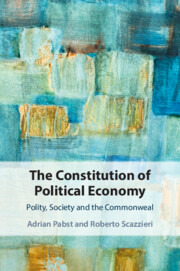Book contents
- The Constitution of Political Economy
- The Constitution of Political Economy
- Copyright page
- Contents
- Tables
- Preface
- Acknowledgements
- Introduction
- Part I Interdependence and the Economic Constitution
- 1 Political Economy in Question
- 2 Sociability and Interdependence
- 3 Association and the Division of Labour
- 4 The Constitution of the Economy
- Part II Political Spaces and Policy Actions
- References
- Name Index
- Subject Index
1 - Political Economy in Question
from Part I - Interdependence and the Economic Constitution
Published online by Cambridge University Press: 03 August 2023
- The Constitution of Political Economy
- The Constitution of Political Economy
- Copyright page
- Contents
- Tables
- Preface
- Acknowledgements
- Introduction
- Part I Interdependence and the Economic Constitution
- 1 Political Economy in Question
- 2 Sociability and Interdependence
- 3 Association and the Division of Labour
- 4 The Constitution of the Economy
- Part II Political Spaces and Policy Actions
- References
- Name Index
- Subject Index
Summary
The contemporary revival of interest in political economy highlights the coexistence of different and opposed conceptions among scholars and policy makers in addressing the interface between the economy and the polity. One set of approaches focuses on individual actors in the marketplace or in the public sphere, while another set of approaches shifts the emphasis to the state as a self-contained and internally undifferentiated collective actor. This chapter outlines a conception of political economy that moves beyond this dichotomy and develops the view that individuals, markets, and states are embedded in a relational field composed of multi-level social interdependencies and institutions. The aim of the chapter is to explore the ‘constitution’ of political economy as the multi-layered and relatively persistent configuration of domains and sub-domains in which economic structures and political actions mutually reinforce or hinder one another, thereby determining the dynamics of social wealth – what we call ‘commonweal.’ The chapter conceptualises political economy as a relational field resulting from overlapping spheres of social life. It refers to the social relationships enabling the material provision of human needs and brings to the fore the political dimension of need satisfaction, which involves balancing and coordinating differentiated interests in society.
- Type
- Chapter
- Information
- The Constitution of Political EconomyPolity, Society and the Commonweal, pp. 13 - 37Publisher: Cambridge University PressPrint publication year: 2023

